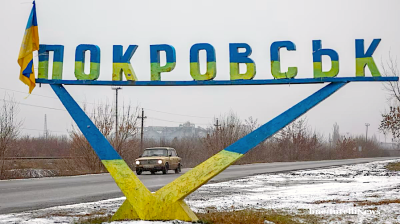Ukrainian President Volodymyr Zelenskiy has submitted a bill to dismiss all 15 judges of the Constitutional Court that will plunge Ukraine into a major constitutional crisis.
The bill is due to be considered by the Verkhovna Rada on October 3 and follows a controversial decision by the court to strike down key anti-corruption laws that were put in place at the insistence of Ukraine’s main donors, including the International Monetary Fund (IMF).
The court nixed a law on October 27 that makes lying on the mandatory annual electronic income declaration by state officials an offence amongst other things that was hailed at the time of its inception in 2016 as a major achievement in the fight against graft.
Zelenskiy called the judges’ decision “worthless” and taken by the judges amid a “real conflict of interest”, according to Zelenskiy’s draft bill. This was the second time the Constitutional Court has tried to overturn the laws; in the previous attempt the count argued that the law impinges on state officials' “freedom of speech.”
If the judges are sacked then that will cause a full-blown constitutional crisis, as neither the president nor Parliament have any powers to sack the judges on the Constitutional Court. Removing the judges of the Constitutional Court is not constitutionally sound, according to the European Commission for Democracy Through Law, an advisory body of the Council of Europe also known as the Venice Commission.
“Terminating the mandate of the judges is in blatant breach of the Constitution and of the fundamental principle of separation of powers. Violating the Constitution, even if for an arguably good cause, cannot lead to a culture of constitutionalism and respect for the rule of law, which the fight against corruption pursues,” said a letter written by Venice Commission head Gianni Buquicchio and Marin Mrcela, the Group of States Against Corruption, that was published on the Council of Europe website on October 31.
Judges can only remove each other with a two-thirds majority vote, and even then only for problems such as ill health and incapacitation. The judges have already accused Zelenskiy of trying to carry out a constitutional coup. The other parties in the Rada have already indicated they will not back Zelenskiy if he follows through with the clearly unconstitutional decision to sack the judges.
On the same day as the Venice Commission released its letter, the president’s representative to the Constitutional Court, Fedir Venislavskiy, insisted on the absolutely justified nature of the president’s legislation. Parliament’s approval of the legislation submitted to the Rada on October 29 will renew societal trust and “resolve the crisis situation” created by the court, he said.
The removal of the judges from the Constitutional Court does make sense, as they have a dubious reputation. As part of their ruling the court stripped most of the powers from the National Agency for Preventing Corruption, an entity that was investigating five judges, or one third of Constitutional Court members. An investigation by the local press caught another of the judges failing to declare property he bought in Crimea after it was annexed by Russia in 2014, which is illegal on two counts – lying on the declaration and doing business with the occupying powers in Crimea.
The Constitutional Court decision has caused a violent reaction from Ukraine’s donors and endangers further co-operation, and money, from the IMF. The EU has also threatened to rescind the visa-free travel in the EU deal Ukraine’s currently enjoy – one of the most popular perks from Ukraine’s pivot to the West following the Euromaidan protests in 2014.
What started as a scandal is rapidly developing into a full-blown crisis and Zelenskiy was forced to hold an emergency session of his National Security and Defence committee on October 30 to respond. He announced that the judges will be dismissed and new legislation to replace the nixed laws has been introduced into the Rada that will also be voted on this week.
In addition, Zelenskiy published an opinion piece in the Financial Times over the weekend where he called out the “pro-Russian” and “oligarchic” forces that are trying to undermine Ukraine’s progress towards becoming a full democratic country.
“Ukraine is under attack – not just at its borders, but also at the heart of its democratic institutions,” Zelenskiy wrote in the Saturday issue of the Financial Times. “This process is an attempt to destroy an essential part of the anti-corruption achievements of the 2014 Revolution of Dignity, built by Ukrainian civil society with the active support of our western partners... As President of Ukraine, I will never allow these dark forces to succeed in their attempt at a counter-revolution.”
While he didn't name names the article was widely seen as an attack on Viktor Medvedchuk, the head of the Political Council of the Opposition Platform, For Life Party, who is a personal friend of Russian President Vladimir Putin and seen as Russia’s proxy in Ukrainian domestic politics.
Zelenskiy to break with his backers
The op-ed also suggests that Zelenskiy is going to break with oligarch Ihor Kolomoisky, his former media business partner, who also used his 1+1 TV channel to back Zelenskiy’s presidential campaign in April 2019.
The court decision’s scandal is the straw that seems to have broken the camel’s back. As bne IntelliNews reported, Ukraine’s donors have become increasingly unhappy with Zelenskiy’s backsliding on reforms for months that started with the President's decision to shake up the government with a major reshuffle on March 3, that included the sacking of the technocratic Ukrainian Prime Minister Oleksiy Honcharuk.
“[A crisis has been] brewing for a while around elite attempts to derail the anti-corruption agenda, which is critical to the IMF and Western support package to Ukraine, and actually the country’s fight against corruption and its ability to become a country with rule of law,” Tim Ash, senior sovereign strategist at BlueBay Asset Management, said in a note emailed to clients.
None of the Ukrainian political elite was happy with the anti-corruption legislation, but the pro-Russian parties and oligarchs have been particularly vocal, as it undermines their position. Kolomoisky has called for Ukraine to default on the IMF debt and turn to Russia for money and trade instead.
While Kolomoisky and Medvedchuk are not natural allies, analysts have speculated they have joined forces to undermine both the legislation and increasingly to undermine Zelenskiy’s position.
“All the above is clearly manna from heaven for Ukraine’s enemies, Russia in particular – and some would indeed argue that this whole constitutional crisis is being fuelled by Russia – such a crisis leaves the country weak, and vulnerable to further Russian intervention. And it does seem as though we are seeing new alliances behind old oligarchic forces and pro-Russian elements to undermine political stability in Ukraine for their own advantage,” says Ash.
And that position has become a lot weaker in recent months. Zelenskiy remains Ukraine’s most popular politician and would still easily win re-election if a vote were held on Sunday, but he seems to have lost his clear majority in the Rada after dozens of deputies in his Servant of the People (SOTP) party have defected to rival fractions.
“After recent defections and a poor showing in local elections, his Servant of the People Faction likely now lacks a majority in the Rada. He might have been able to look for support from pro-European opposition parties in the Rada – European Solidarity of former President Poroshenko and Golos. But even that now seems unlikely,” says Ash.
The problem is that if Zelenskiy has finally taken a firm stand against the Russian parliamentary forces as well as leading oligarchs, including Kolomoisky, then he has waited too long and no longer has the numbers in the Rada to force through new legislation to curb their actions.
Other analysts speculate that Zelenskiy's public statements and draft bills are simply ruses to placate the EU and IMF but nothing will come of them.
Riot Act
If it is all just for show, Ukraine’s donors are unlikely to be fobbed off with a little political theatre. It is looking increasingly likely that Ukraine will be punished as promised.
Without restoration of the corruption fighting agencies, “not only visa-free travel will be affected,” Foreign Minister Dmytro Kuleba warned Friday night on Savik Shuster's Freedom of Speech TV programme. “We will lose the support of the countries with which we have the largest trade turnover, which support Ukrainian reforms the most, which support us the most in the fight against Russian aggression.”
An IMF spokesperson told Ukrinform: “The launch of a comprehensive electronic system for asset and income disclosure by high-level officials in 2016 was, and remains, a critical step forward in anti-corruption efforts and should not be dismantled… and is therefore an essential commitment under the IMF-supported programme.”
Zelenskiy is throwing himself into the fight and has been whipping the Rada for support. In the run-up the vote on the so-called anti-Kolomoisky banking law that was signed on May 18, Zelenskiy went to the Rada in person to garner support for the bill that the IMF had made a pre-requisite for the release of a $2.2bn tranche of the $5bn stand-by agreement (SBA).
On registering his new anti-corruption bill this weekend the president warned deputies what the cost of failure would be: “We will not have money. We will not have support. Projects on which agreement was reached will be cancelled, as well as World Bank support. We will have a big hole in the budget.”
News

Russia test fires its Burevestnik nuclear-powered cruise missile
Russia’s Burevestnik nuclear-powered cruise missile has no analogues in the world, Russian President Vladimir Putin said, as the Kremlin escalates the unfolding missile arms race with Ukraine another notch.

Russia claims to surround Pokrovsk
Russia’s chief of the general staff Valery Gerasimov triumphantly reported to Putin that 31 Ukrainian battalions have been encircled in Pokrovsk and 18 battalions in Kupyansk, the hottest spot in the war.
.jpg)
Brazil and US to start urgent tariff negotiations after Trump-Lula meeting
Brazilian President Luiz Inácio Lula da Silva and US President Donald Trump have agreed to start immediate negotiations on tariffs and sanctions imposed by Washington, following a meeting in Malaysia that sought to ease trade tensions.

Cambodia and Thailand agree peace deal
Thailand and Cambodia have agreed a peace deal to mark the end of a conflict earlier in the year as Cambodian Prime Minister Hun Manet and Thai Prime Minister Anutin Charnvirakul attended a signing ceremony overseen by US President Donald Trump.


